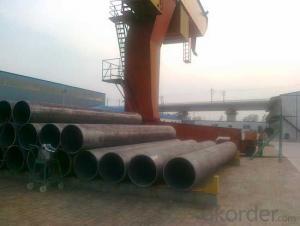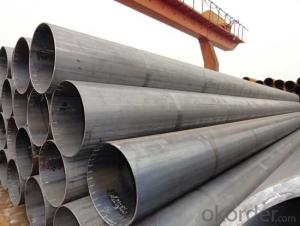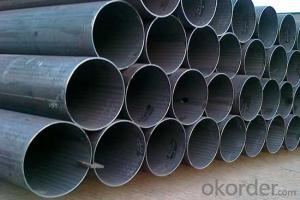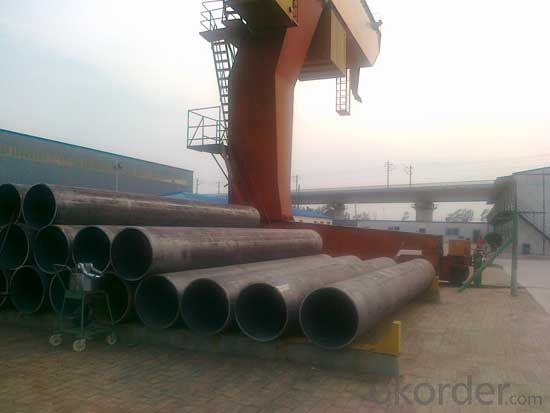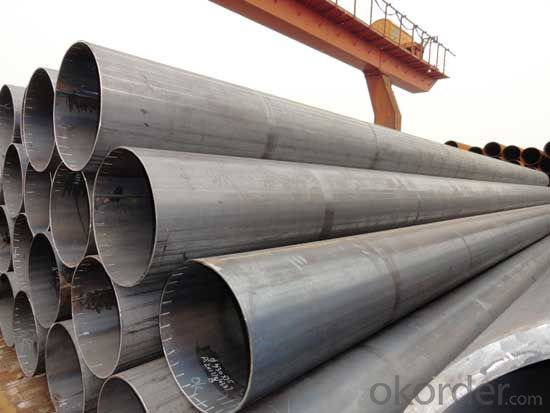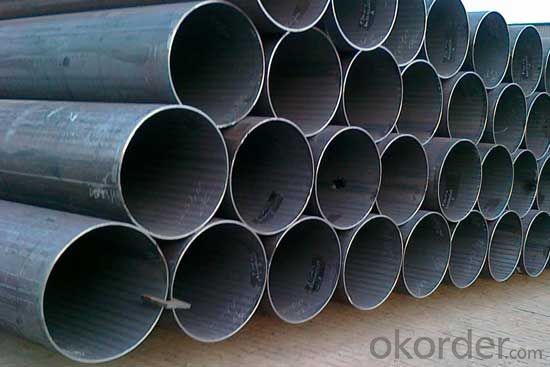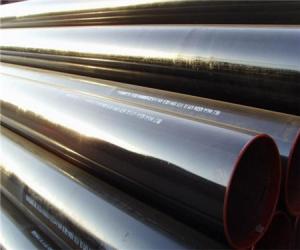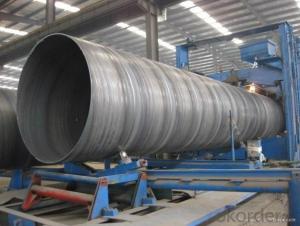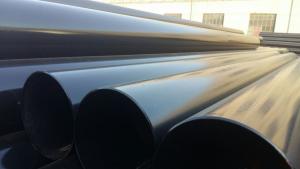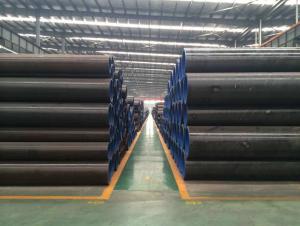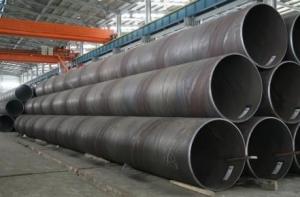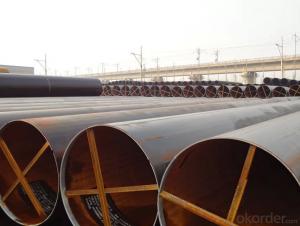LSAW Steel Pipe API Double Submerged Arc Welded Steel Pipe for Construction Structure
- Loading Port:
- Tianjin
- Payment Terms:
- TT or LC
- Min Order Qty:
- 5 m.t.
- Supply Capability:
- 10000 m.t./month
OKorder Service Pledge
OKorder Financial Service
You Might Also Like
LSAW Pipe
LSAW / Longitudinally Submerged Arc Welded Steel Pipe
Outer Diameter: 400-1520mm
Wall Thickness: 8mm ~ 50mm
Length: 3m ~ 12.3m
Standard / Steel Grade
API5LPSL1/PSL2Gr.B,X42~X80,ASTMA252Gr.2,Gr.3,ASTMA53Gr.B
EN10217-1,EN10219-1,EN10025 S235JR,S275JR,S355JR, EN10224 L235,L275,L355,DIN 1629 ST37,ST44,ST52
GB/T9711.1-1997,GB/T9711-2011: L245~L555
GB/T3091-2008:Q235B,Q345B,20#,16Mn etc.
Usage
For conveying petroleum, natural gas, coal gas,drainage,water, chemical material and other medium/low pressure liquids and used for piling project, electric power projects, heat-supply, shipbuilding & construction projects.
Delivery Condition
Beveled or plain ends with or without protector or protective caps with or without varnish/2PP/2PE/3PE/ 3PP/FBE external anti-corrosive coating with or without cement mortar/ /Liquid type epoxy resin/ FBE internal anti-corrosive coating as per customer's requirements
- Q: What is the cost of steel pipes compared to other pipe materials?
- The cost of steel pipes is typically higher compared to other pipe materials such as PVC or copper.
- Q: What is the difference between internal and external coating of steel pipes?
- The difference between internal and external coating of steel pipes lies in their purpose and application. Internal coating is applied to the inner surface of the pipe to protect it from corrosion, enhance flow efficiency, and prevent contamination of transported fluids. It is commonly used in industries such as oil and gas, water treatment, and chemical processing. On the other hand, external coating is applied to the outer surface of the pipe to protect it from corrosion caused by environmental factors such as moisture, chemicals, and physical damage. It is typically used in underground or above-ground applications, including pipelines, structural steel, and water distribution systems.
- Q: What are the different types of steel pipe joints for underwater applications?
- Some different types of steel pipe joints for underwater applications include flanged joints, welded joints, and mechanical joints. Flanged joints involve connecting pipes by bolting together flanges at the ends. Welded joints are created by fusing the ends of pipes together using heat and pressure. Mechanical joints use couplings or connectors to join pipes together, typically with rubber seals to ensure a watertight connection.
- Q: How do steel pipes handle extreme weather conditions?
- Steel pipes are highly durable and can withstand extreme weather conditions. They have excellent resistance to corrosion, which prevents them from rusting or deteriorating in harsh environments. Additionally, their strength and rigidity enable them to withstand high winds, heavy snow loads, and temperature variations without compromising structural integrity. Overall, steel pipes are well-suited for handling extreme weather conditions and provide reliable performance in such environments.
- Q: How many meters per ton of steel tube?
- Metric tons are metric units and China adopts metric system, so what we Chinese usually say "ton" means "metric ton", which can be regarded as "metric ton"1 metric tons (tonne/metric ton) = 1000 kg1 tons = 1000 kg1 kg = 1000 grams
- Q: Can steel pipes be used for oil well casing?
- Yes, steel pipes can be used for oil well casing. Steel pipes are commonly used for oil well casing due to their strength, durability, and ability to withstand high pressure and extreme environmental conditions.
- Q: What are the different types of connections used with steel pipes?
- There are several types of connections commonly used with steel pipes, including threaded connections, welded connections, flanged connections, and grooved connections.
- Q: What is the cost of steel pipes compared to other piping materials?
- The cost of steel pipes compared to other piping materials can vary depending on factors such as the size, grade, and specifications of the pipes, as well as market conditions and location. In general, steel pipes tend to be more expensive than some alternative piping materials such as PVC (polyvinyl chloride) or HDPE (high-density polyethylene). However, when compared to other materials like copper or stainless steel, steel pipes can often be more cost-effective. Steel pipes are known for their durability, strength, and resistance to high pressures and temperatures, making them suitable for various applications such as oil and gas pipelines, plumbing systems, and structural supports. Their longevity and reliability can offset the initial higher cost, as they often require less maintenance and have a longer lifespan than other materials. Additionally, steel pipes are readily available in different sizes and grades, making them versatile and adaptable to different project requirements. This availability and versatility can contribute to their cost-effectiveness, as they can be easily sourced and customized to specific needs. It's important to note that prices for steel pipes can fluctuate due to market conditions and factors such as raw material costs, transportation expenses, and labor charges. Therefore, it is advisable to consult with suppliers or industry experts to get accurate pricing information for steel pipes based on specific project specifications and market conditions.
- Q: What are the different methods of wrapping steel pipes for corrosion protection?
- There are several different methods of wrapping steel pipes for corrosion protection. These methods can vary depending on the specific application and environmental conditions. Some of the common methods include: 1. Tape Wrapping: This involves wrapping the steel pipes with a corrosion-resistant tape, such as polyethylene or polypropylene tape. The tape acts as a barrier between the pipe surface and the corrosive elements, preventing direct contact and reducing the risk of corrosion. 2. Inner Wrapping: Inner wrapping involves applying a protective coating or lining to the inside surface of the steel pipe. This method is commonly used for pipes that transport fluids or gases, as it provides an additional layer of protection against corrosion from the inside. 3. External Coating: External coating is a widely used method for corrosion protection. It involves applying a protective coating to the outside surface of the steel pipe. The coating can be a variety of materials, such as epoxy, polyethylene, or polyurethane, which provide a barrier against corrosive elements and extend the lifespan of the pipe. 4. Cathodic Protection: Cathodic protection is an electrochemical method used to protect steel pipes from corrosion. It involves connecting the steel pipe to a sacrificial anode, such as zinc or magnesium, which corrodes instead of the pipe. This process helps to prevent the corrosion of the steel pipe by diverting the corrosive current away from the pipe surface. 5. Heat Shrink Sleeve: Heat shrink sleeves are commonly used for corrosion protection in underground or submerged applications. These sleeves are made of a heat-activated material that shrinks when heated, creating a tight seal around the pipe. The sleeve forms an effective barrier against moisture and corrosive elements, preventing direct contact with the steel pipe. 6. Fusion Bonded Epoxy (FBE) Coating: FBE coating is a thermosetting powder coating that is applied to the surface of the steel pipe and then fused to form a protective layer. This coating provides excellent adhesion and corrosion resistance, making it a popular choice for steel pipes in various applications. It is important to note that the selection of the appropriate method for wrapping steel pipes for corrosion protection depends on factors such as the environment, the type of corrosive elements present, the intended application, and other specific requirements. Professional advice and consultation may be necessary to determine the most suitable method for a particular situation.
- Q: What are the applications of stainless steel pipes?
- Stainless steel pipes have a wide range of applications due to their excellent properties. They are commonly used in industries such as oil and gas, chemical, pharmaceutical, food processing, and construction. These pipes are resistant to corrosion, heat, and pressure, making them suitable for transporting various fluids and gases. Additionally, they are used in plumbing systems, HVAC systems, structural frameworks, and even in decorative applications like handrails and furniture.
Send your message to us
LSAW Steel Pipe API Double Submerged Arc Welded Steel Pipe for Construction Structure
- Loading Port:
- Tianjin
- Payment Terms:
- TT or LC
- Min Order Qty:
- 5 m.t.
- Supply Capability:
- 10000 m.t./month
OKorder Service Pledge
OKorder Financial Service
Similar products
Hot products
Hot Searches
Related keywords
